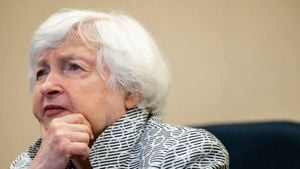Allan Lichtman, the historian renowned for his uncanny election prediction abilities, is back with his latest analysis as the United States gears up for the 2024 presidential election. His record is nothing short of impressive—he has accurately predicted the outcome of nine out of the last ten presidential contests. With the upcoming election just around the corner, Lichtman has confidently thrown his hat in the ring, predicting Vice President Kamala Harris to win the White House if she becomes the Democratic nominee.
So, what makes Lichtman’s predictions tick? His method relies on what he calls the “13 keys,” which are true-false statements reflecting the political climate and the incumbent party's performance. According to his forecast, eight of these keys currently favor Harris, meaning she has the upper hand, as opposed to just three keys benefiting former President Donald Trump. You might be wondering, what exactly are these keys?
The keys cover various aspects, including whether the sitting president is seeking reelection, the party has made significant achievements, and the economic climate is solid, among others. For example, if the White House party gained seats during the midterms or if the current incumbent has been devoid of scandal, those are all indicators working positively for Harris.
Some of the factors weighed heavily by Lichtman include foreign policy success and overall economic health. Currently, he suggested the Biden administration's involvement in the Gaza conflict could potentially flip the scales, depending on public perception and sentiment. Nevertheless, he asserts, even with possible downturns, Trump's chances to retake the presidency would still be slim if Harris remains the nominee.
Now, this isn’t the first time Lichtman’s predictions have stirred the pot. His reputation has been both lauded and challenged since he began using this model following Ronald Reagan’s landslide victory back in 1984. Throughout the years, he has garnered attention for his methodical and analytical approach, blending historical trends with current day socio-political conditions.
But how has Lichtman's model held up against the backdrop of today’s complex political environment? Some critics argue its binary framework might fail to account for intricacies of modern elections, necessitating broader data inputs beyond just the keys. It’s also worth noting this anticipation isn’t unchallenged; other predictive models, like those by political scientist Helmut Norpoth, had their failures too. Norpoth’s primary model even suggested Trump would win decisively in both the 2016 and 2020 elections, only to miss the mark—adding to the scrutiny of prediction strategies.
The 2024 election promises to be like no other, with fierce competition anticipated from both sides. Lichtman’s prediction stands out as part of the wider narrative as the political season heats up, and both Democratic and Republican candidates prepare their platforms.
Moving forward, Lichtman reminds everyone of the fundamental truth: the outcome is still quite reliant on voter engagement. He urges the electorate to participate actively, emphasizing, “the outcome is up to you, so get out and vote.” His words serve as both encouragement and warning against complacency for all those involved.
While many are eager to see if Lichtman’s prediction will hold true, it also highlights the importance of scrutiny among prediction models and the dynamic nature of political engagements. With so much data available today, from economic trends to social media activity, it begs the question: can a model really capture the essence of human political behavior accurately?
Despite the analytical approach taken by Lichtman and others, elections often hinge on unexpected outcomes and voter turnout, which can skew any predictive model. This unpredictability is perhaps what makes the political race so thrilling. Only time will tell how accurate Lichtman’s forecast will be and whether Harris or Trump will claim the White House come November 2024.
One thing is for sure, as we step closer to the voting booths, the air will be thick with anticipation and speculation about who will rise to the challenge.



